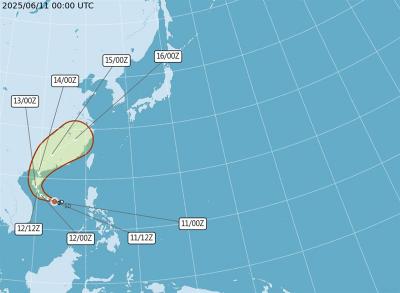There is no scientific evidence that people can accurately predict the occurrence of earthquakes simply by monitoring behavioral changes in certain fish species or unusual cloud patterns, the Central Weather Administration (CWA) said yesterday.
“Many people have heard that some animals can sense earthquakes before they occur and respond with unusual behaviors, or earthquakes would surely ensue when certain natural phenomena happen. So far statements similar to these have yet to be substantiated by any scientific evidence,” the state-run meteorology agency wrote on Facebook.
Some call oarfish or the Ishikawa roughfin “earthquake fish” because they often emerge before and after quakes, the agency said.

Photo: Tsai Shu-yuan, Taipei Times
However, scientific evidence suggests that behaviors of fish could be affected by sea temperature, water quality and feeding habits, but a direct causal relation between fish behavior and earthquakes has yet to be established, it said.
Others call altocumulus clouds — small clouds with a clear profile — “earthquake clouds” as they often appear before the occurrence of earthquakes, whether they come in oblate or round shapes, tiles or waves.
“But shapes and changes of clouds are affected by various phenomena, and scientists have yet to ascertain a direct relationship between earthquakes and particular shapes of clouds. As such, one cannot predict the occurrence simply by observing changes in clouds,” the agency said.
Scientists have found small changes within the Earth’s interior to be more reliable precursors for earthquakes, such as changes in the number of seismic activities, minor deformations of the Earth’s crust and abnormal changes in the Earth’s magnetic field, the agency said, adding that these phenomenon need to observed and monitored through sophisticated scientific instruments, rather than through pure observations of nature.
“Myths and rumors about earthquakes might lead to misjudgements or erroneous forecasts. People should use scientific methods and techniques to conduct risk assessments for earthquakes, rather than mysterious legends,” the agency said.

A magnitude 6.4 earthquake struck off the coast of Hualien County in eastern Taiwan at 7pm yesterday, the Central Weather Administration (CWA) said. The epicenter of the temblor was at sea, about 69.9km south of Hualien County Hall, at a depth of 30.9km, it said. There were no immediate reports of damage resulting from the quake. The earthquake’s intensity, which gauges the actual effect of a temblor, was highest in Taitung County’s Changbin Township (長濱), where it measured 5 on Taiwan’s seven-tier intensity scale. The quake also measured an intensity of 4 in Hualien, Nantou, Chiayi, Yunlin, Changhua and Miaoli counties, as well as

Taiwan is to have nine extended holidays next year, led by a nine-day Lunar New Year break, the Cabinet announced yesterday. The nine-day Lunar New Year holiday next year matches the length of this year’s holiday, which featured six extended holidays. The increase in extended holidays is due to the Act on the Implementation of Commemorative and Festival Holidays (紀念日及節日實施條例), which was passed early last month with support from the opposition Chinese Nationalist Party (KMT) and Taiwan People’s Party. Under the new act, the day before Lunar New Year’s Eve is also a national holiday, and Labor Day would no longer be limited

COMMITMENTS: The company had a relatively low renewable ratio at 56 percent and did not have any goal to achieve 100 percent renewable energy, the report said Pegatron Corp ranked the lowest among five major final assembly suppliers in progressing toward Apple Inc’s commitment to be 100 percent carbon neutral by 2030, a Greenpeace East Asia report said yesterday. While Apple has set the goal of using 100 percent renewable energy across its entire business, supply chain and product lifecycle by 2030, carbon emissions from electronics manufacturing are rising globally due to increased energy consumption, it said. Given that carbon emissions from its supply chain accounted for more than half of its total emissions last year, Greenpeace East Asia evaluated the green transition performance of Apple’s five largest final

The first tropical storm of the year in the western North Pacific, Wutip (蝴蝶), has formed over the South China Sea and is expected to move toward Hainan Island off southern China, the Central Weather Administration (CWA) said today. The agency said a tropical depression over waters near the Paracel and Zhongsha islands strengthened into a tropical storm this morning. The storm had maximum sustained winds near its center of 64.8kph, with peak gusts reaching 90kph, it said. Winds at Beaufort scale level 7 — ranging from 50kph to 61.5kph — extended up to 80km from the center, it added. Forecaster Kuan Hsin-ping